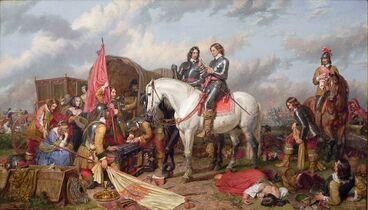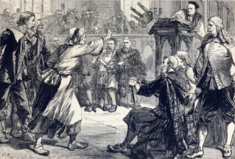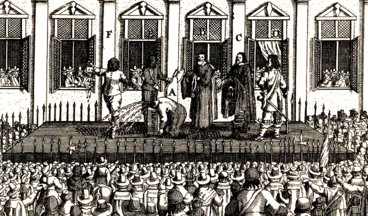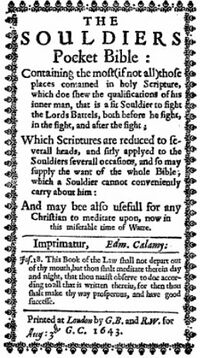English Revolution
2) 1637 riot in an Edinburgh church in response to top-down church reforms imposed on the more radical Scottish Protestants.
3) John Lilburne, outspoken advocate of political rights and freedom of speech whose writings remain cited in liberal jurisprudence.
4) Execution of King Charles I in 1649 for high treason.
The English Civil War, typically known among Marxists as the English Revolution, was a wide-reaching series of civil wars fought from 1642 to 1652 in England mainly between two factions: the Parliamentarians ("Roundheads") and the Royalists ("Cavaliers"). On its face, the conflict presented itself only as a political struggle between Parliamentarianism and absolutism, and a religious struggle between hierarchy and radical church democracy. However, Karl Marx, based on his materialist analysis of history, argued that these conflicts were merely secondary effects of a deeper shift in English society whose ultimate cause had been the century-long growth of the bourgeoisie. After several conflicts spanning the island of Great Britain, the Parliamentarian faction won out in 1647, deposing King Charles I. The radical faction of the victorious Parliamentarians forced moderate MPs out of Parliament in 1649 and had Charles tried, convicted, and executed for treason. The monarchy was abolished, and Parliamentarian officer Oliver Cromwell became the first Lord Protector of the new republican Commonwealth of England, Scotland and Ireland.
After Cromwell's death, the loyalty of the military collapsed, and his son and successor was deemed inadequate and promptly deposed. Charles I's son returned from exile to be crowned King Charles II, beginning an unstable period of compromise which would only end in 1688 when Parliament would depose Charles's successor and brother, James II. Later Whig historians would accord this development great importance, calling it the "Glorious Revolution", in contrast to the "Rebellion" of the 1640s. Marx and Engels, on the contrary, considered the Glorious Revolution to be "puny" in importance compared to the Civil War before it.[1]
In Marx's view, the events of the English Civil War followed a pattern he termed bourgeois revolution, in which the productive forces of an old, typically absolutist-feudal, society come into conflict with emerging capitalist social relations, and thus considered it akin to the Dutch Revolt, the American Revolution, and the type species in France. The wars were part of a broader conflict involving Scotland and Ireland, a series of events known collectively as the Wars of the Three Kingdoms.
History
This section is empty. You can help by adding to it. |
Analysis
"Revolution" or "civil war"
Class struggle
Radicalism
See also
- England's 17th Century Revolution (article), brief outline of the class shifts of the 17th century by Karl Marx
References
- ↑ Engels, Frederick. "Socialism: Utopian and Scientific, Introduction to the 1892 English edition". Marxists Internet Archive. Retrieved 2023-05-13.
Further reading
- Christopher Hill, The English Revolution, 1640; on Marxists Internet Archive.




